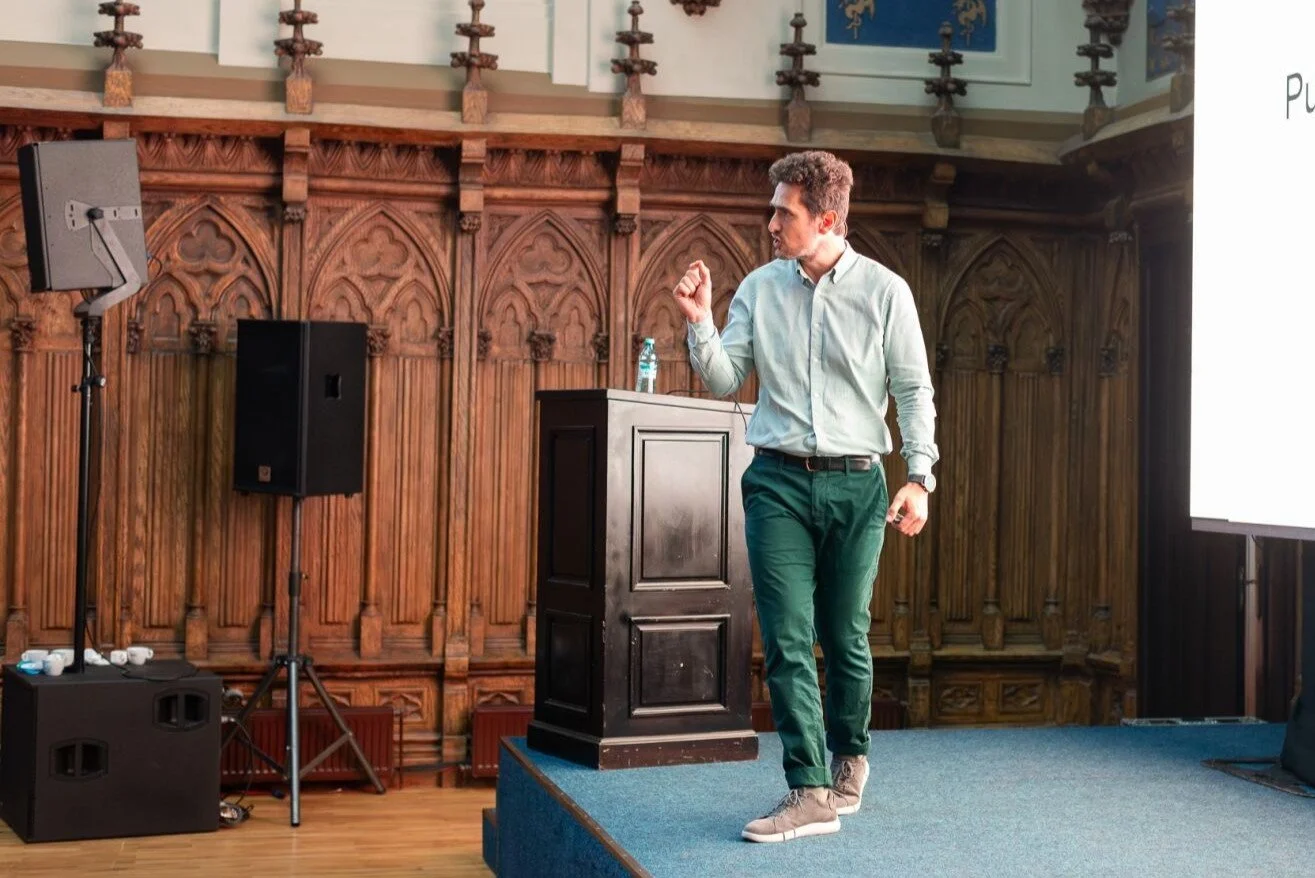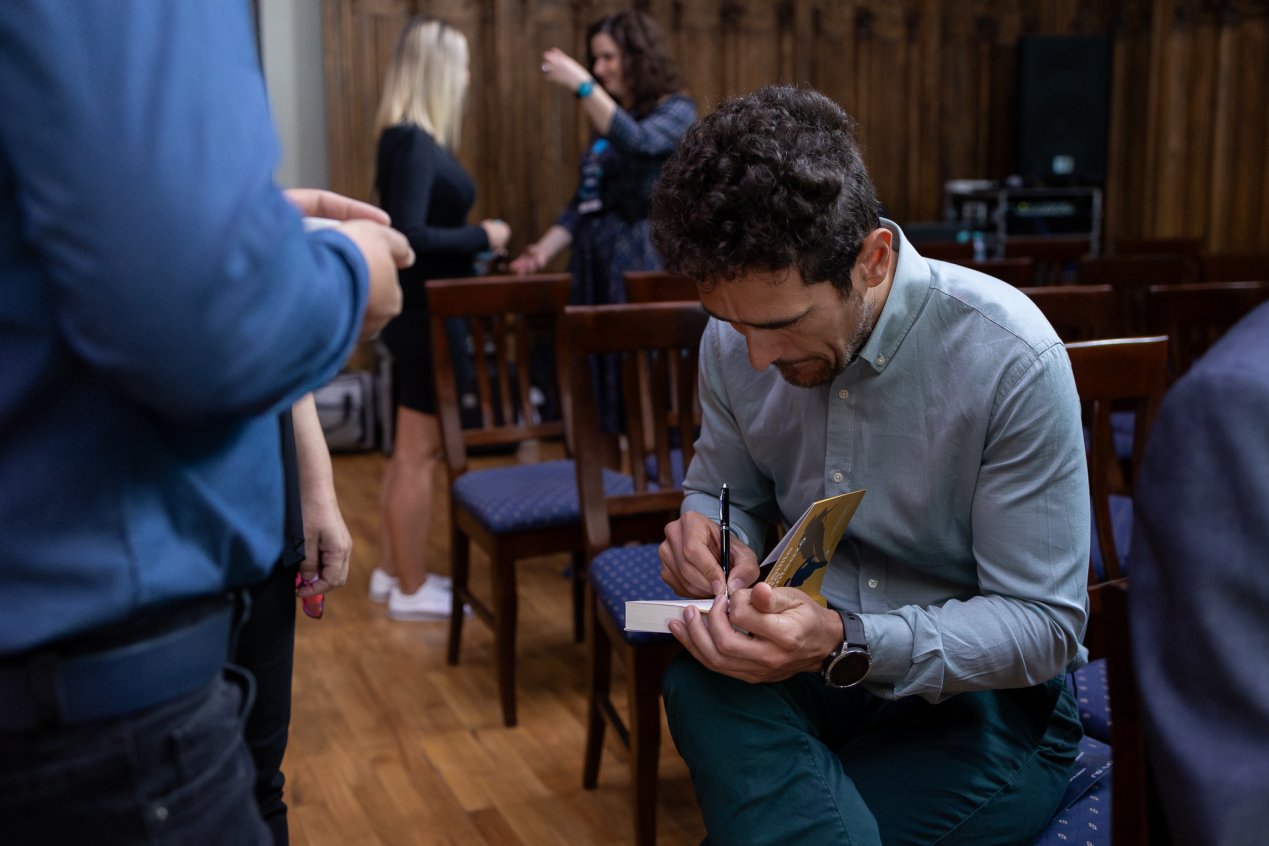From Results-Driven to Relationship-Focused: Exploring 'Battles that Matter' and Authentic Leadership
Interview with Magor Csibi @ The Revup Conference: Inspiring Leaders
Though still in the early stages of his life and career, Magor Csibi has already gathered an impressive collection of experiences and achievements. Embarking on inspiring journeys across the globe, he not only left an impact on others but also embraced life-altering lessons that had him reconsider everything he thought he knew about people, leadership and even himself.
Currently settled back in Romania, Magor is the Head of Leadership Practice at Trend Consult where he supports leaders in building positive organizational cultures that nurture people, compassion, creativity and personal growth, amongst others.
During The Revup Conference: Inspiring Leaders, he talked about the importance of genuine behaviours, the consistent, small actions that in time lead to positive change, greater results and healthier organizations. After the event, Magor sat down with Tech Storyteller to discuss some of the key stories from “Battles That Matter” - the book he wrote in collaboration with Radu Predescu - and to dive into what success and happiness looks now for someone who shifted from a results-first mindset to cultivating authentic connections.
The interview below sheds light on both the struggles and joys of someone who is constantly learning, evolving and striving to turn into a better version of himself. And in a way it also speaks about the burden and happiness of being a leader and fearing that you will somehow disappoint your co-workers.
Magor, it is an honour to have you in The Revup Community and thank you for allowing yourself to be vulnerable in the interview.
Tech Storyteller: What can you tell us about Magor the individual, rather than Magor the professional?
Magor Csibi: I am still learning about myself. When I turned 30 I realized that by that time I had only focused on goals and KPIs and didn’t actually know anything about me. So now I’m on a long self-discovery journey in which I’m learning a lot. For instance, for a long-time running has been an obsession of mine because I thought it somehow offered me a balance with everything else that was happening, but this was not true. I would run to find this balance, without realizing it was an obsession, not something I really enjoyed. The moment I realized this, I shifted my mindset and running became a pleasure.
I want to know who I am and what I want from life. Yet sometimes I struggle because it is challenging to go from fitting into a pattern, doing things because they need to get done and actually having the patience to be myself, to allow myself to say what I like and don’t like.
I measure my success by the genuine connections I have, and I try to nurture them actively and consciously.
Tech Storyteller: What does success look to you?
Magor Csibi: This is a tough one. There are still moments when I get competitive and measure performance and success by looking at the numbers. And unfortunately, this comes with unhappiness, and pushing people away, so I continue to struggle with this sometimes. What I try to do is shift my perspective and measure my success by the genuine connections I have, and to nurture them actively and consciously. As Tamara Markova also mentioned during her presentation at The Revup Conference, there are at least four main life areas we need to consider, so I do my best not to focus on just one and to not go back to my previous mindset. There are other aspects that are important too and my challenge is to acknowledge them all.
Tech Storyteller: How would you define happiness at work?
Magor Csibi: For me, happiness at work is linked to how we are as a team. I cannot be completely happy with my success if it doesn’t also benefit the team and they can enjoy it too. So, it’s about how you build your success so others can enjoy what you do. I try to be there for my colleagues and enjoy our struggles and accomplishments as a group, considering everyone’s needs and desires. It’s about not being alone at the end of the day and having someone to celebrate your joint professional achievements.
Tech Storyteller: I read the book you wrote together with Radu Predescu and I enjoyed it a lot; there were many insightful takeaways. In the first part of it, you dive into your time as a manager in Korea, and all the challenges that came with it. There’s a moment that stuck with me – on your last day, at the farewell party your colleagues threw, you realized that “it’s never about you, as a manager, as a leader, rather about the people you are leading”. And I’m curious how did this epiphany change your leadership style?
Magor Csibi: It is hard to measure the impact now because at the moment I am no longer leading teams. However, since then I have kept in touch with the people on my team, I know who is now working for an NGO, for some I wrote recommendations and attended interviews. What I am trying to say is that I did not turn the page and that was it, I still care about those people and I am happy to know they are well. In the end, the best thing you can do, as a human being first and then as a leader, is to genuinely be happy for other people and celebrate their success. We all have a certain amount of success in life, but if we can find it in ourselves to be happy for others, we will lead much happier lives.
We all have a certain amount of success in life, but if we can find it in ourselves to be happy for others, we will lead much happier lives.
Tech Storyteller: Another interesting story that stuck with me, this time one of Radu’s, is related to the dispute between two officers that was eventually solved by enjoying a couple of coffees together. The idea is that by spending time getting to know each other and understanding how they work and think, colleagues (be it in corporations or in the army) can collaborate better. It is not all about results, but also about connection.
My question to you is, when does it stop bringing real value? Because I noticed a certain tendency in corporations to have mandatory coffee or other types of gatherings to “get to know each other”. This is not a bad idea, of course, but my concern is the real reason behind it – do we really want to create a genuine connection, or has it become just ‘the norm’ and we have to do it to keep up with the trends.
[A little background story for the readers: Radu talks about a disagreement between two Romanian officers that quickly escalated and reached their commander. Without asking for details or offering solutions, their commander simply asked them how many coffees they had together since getting there. After two weeks and four coffees, the two officers managed to solve all their issues].
Magor Csibi: I think this is something that everyone participating should think about. I mean, if you have a coffee with a colleague, you should do it because you are really interested in getting to know them, their difficulties, and their aspirations. You do this to get the chance to really connect. However, if you do this to cross one thing off your list, you miss this opportunity. A formal interest, or worse, fake empathy does not lead to a genuine relationship. And in time this could only damage the collaboration.
I admit I used to do this, pretending to care because I knew this was the right way, but at that time it wasn’t me and it showed. So now I know that when I voluntarily spend time with other people and I am really interested, I also offer them the space to be themselves and show who they are. When we do these activities just because they are trendy, we not only miss the chance to connect to people, but we are also robbing them of the opportunity to be themselves.
Tech Storyteller: How can we become better leaders?
Magor Csibi: By listening more. Good leadership is first and foremost about listening. Of course, there are also moments when we do strategies, create visions, do brainstorming sessions to come up with new ideas or solutions. But mostly, it is about observing and actively listening and if we fail to do this, the chance of us becoming good leaders is quite small.
We truly appreciate Magor for dedicating time to participate in this interview and for authentically sharing insights during our discussion. His valuable experiences serve as a significant guide for individuals on their journey to becoming better leaders.
Written and interviewed with love by
Ionela Barbuta, Tech Storyteller





